Öz
Bu araştırmanın amacı, antrenörlerin antrenmanda, müsabaka öncesi, esnası ve sonrasında kullandıkları motivasyon söylemlerinin incelenmesidir. Araştırmaya çeşitli seviyelerde ve branşlarda antrenörler katılmıştır. Antrenörlerle, yarı yapılandırılmış görüşme formu aracılığıyla görüşme gerçekleştirilmiştir. Toplanan veriler nitel araştırma yaklaşımı altında değerlendirilen içerik analizi ile çözümlenmiştir. Verilerin içerisinde yer alan temalar keşfedilmiştir. Antrenör söylemleri analiz edilerek temalar belirlenmiş ve her bir söylem bu temalar altında kategorilere ayrılmıştır. Antrenörlerin, sporcularına karşı olumlu bir yaklaşımla gelişime açık, teknik ve taktik becerileri geliştirici motivasyon söylemlerinde bulundukları görülmüştür.
Anahtar Kelimeler
Destekleyen Kurum
TÜBİTAK
Proje Numarası
1919B012101115
Teşekkür
Bu araştırma, TÜBİTAK 2209-A Üniversite Öğrencileri Araştırma Projeleri Destekleme Programı tarafından destek alan “Antrenörlerin motivasyon söylemlerinin sportif erdem açısından değerlendirilmesi: Öz Belirleme Perspektifi” başlıklı projeden üretilmiştir. Projeye destek ve katkılarından dolayı TÜBİTAK’a teşekkür ederiz.
Kaynakça
- Blanchard, C. M., Amiot, C. E., Perreault, S., Vallerand, R. J., &Provencher, P. (2009). Cohesiveness, coach's interpersonal style and psychological needs: Their effects on self- determination and athletes' subjective well-being. Psychology of Sport and Exercise, 10(5), 545-551.
- Bruner, M. W., Eys, M. A., Wilson, K. S., &Cote, J. (2014). Group cohesion and positive youth development in team sport athletes. Sport, Exercise, and Performance Psychology, 3, 219-227.
- Cashmore, E. (2008). Sport and exercise psychology: The key concepts. Routledge.
- Çiftçi,N. (2017). Öğretmenlerin algılarına göre motivasyon kaynaklarının belirlenmesi. [Yüksek lisans tezi, Maltepe Üniversitesi].Dspace@maltepe. https://hdl.handle.net/20.500.12415/3917
- Escarti, A., & Guzman, J. F. (1999). Effects of feedback on self-efficacy, performance, and choice in an athletic task. Journal of Applied Sport Psychology, 11(1), 83-96.
- Horn, T. S. (2008). Coaching effectiveness in the sport domain. İn T. S. Horn (Ed), Advances in sport psychology (3rd edition) (pp. 239-268). Champaign, İL: Human Kinetics.
- Ives, J. C., Straub, W. F., & Shelley, G. A. (2002). Enhancing athletic performance using digital video in consulting. Journal of Applied Sport Psychology, 14(3), 237-245.
- Ryan, R. M., & Deci, E. L. (2002). Overview of self-determination theory: An organismic dialectical perspective. İn E. L. Deci, R. M. Ryan (Eds.), Handbook of self-determination research (pp. 3-33). Rochester, NY: University of Rochester Press.
- Smith, R. E., Smoll, F. L., & Barnett, N. P. (1995). Reduction of children's sport performance anxiety through social support and stress-reduction training for coaches. Journal of applied developmental psychology, 16(1), 125-142.
- Smith, R. E., Smoll, F. L., & Cumming, S. P. (2007). Effects of a motivational climate intervention for coaches on young athletes’ sport performance anxiety. Journal of sport and exercise psychology, 29(1), 39-59.
- Vallerand, R. (2001). A hierarchical model of intrinsic and extrinsic motivation in sport and exercise. İn G. C. Roberts (Ed.), Advances in motivation in sport and exercise (pp. 263– 319). Champaign, İL: Human Kinetics.
Öz
The purpose of this research is to examine the motivational discourses used by coaches in training, before, during and after the competition. Coaches at various levels and sports participated in the research. Interviews were conducted with the coaches through a semi-structured interview form. The collected data were analyzed by content analysis, which was evaluated under the qualitative research approach. The themes in the data were discovered. The coaches’ discourses were analyzed, and themes were determined, and each discourse was categorized under these themes. It has been observed that the coaches have a positive approach towards their athletes and are open to development and make motivational statements that improve technical and tactical skills.
Anahtar Kelimeler
Proje Numarası
1919B012101115
Kaynakça
- Blanchard, C. M., Amiot, C. E., Perreault, S., Vallerand, R. J., &Provencher, P. (2009). Cohesiveness, coach's interpersonal style and psychological needs: Their effects on self- determination and athletes' subjective well-being. Psychology of Sport and Exercise, 10(5), 545-551.
- Bruner, M. W., Eys, M. A., Wilson, K. S., &Cote, J. (2014). Group cohesion and positive youth development in team sport athletes. Sport, Exercise, and Performance Psychology, 3, 219-227.
- Cashmore, E. (2008). Sport and exercise psychology: The key concepts. Routledge.
- Çiftçi,N. (2017). Öğretmenlerin algılarına göre motivasyon kaynaklarının belirlenmesi. [Yüksek lisans tezi, Maltepe Üniversitesi].Dspace@maltepe. https://hdl.handle.net/20.500.12415/3917
- Escarti, A., & Guzman, J. F. (1999). Effects of feedback on self-efficacy, performance, and choice in an athletic task. Journal of Applied Sport Psychology, 11(1), 83-96.
- Horn, T. S. (2008). Coaching effectiveness in the sport domain. İn T. S. Horn (Ed), Advances in sport psychology (3rd edition) (pp. 239-268). Champaign, İL: Human Kinetics.
- Ives, J. C., Straub, W. F., & Shelley, G. A. (2002). Enhancing athletic performance using digital video in consulting. Journal of Applied Sport Psychology, 14(3), 237-245.
- Ryan, R. M., & Deci, E. L. (2002). Overview of self-determination theory: An organismic dialectical perspective. İn E. L. Deci, R. M. Ryan (Eds.), Handbook of self-determination research (pp. 3-33). Rochester, NY: University of Rochester Press.
- Smith, R. E., Smoll, F. L., & Barnett, N. P. (1995). Reduction of children's sport performance anxiety through social support and stress-reduction training for coaches. Journal of applied developmental psychology, 16(1), 125-142.
- Smith, R. E., Smoll, F. L., & Cumming, S. P. (2007). Effects of a motivational climate intervention for coaches on young athletes’ sport performance anxiety. Journal of sport and exercise psychology, 29(1), 39-59.
- Vallerand, R. (2001). A hierarchical model of intrinsic and extrinsic motivation in sport and exercise. İn G. C. Roberts (Ed.), Advances in motivation in sport and exercise (pp. 263– 319). Champaign, İL: Human Kinetics.
Ayrıntılar
| Birincil Dil | Türkçe |
|---|---|
| Konular | Egzersiz ve Spor Bilimleri |
| Bölüm | Araştırma Makaleleri |
| Yazarlar | |
| Proje Numarası | 1919B012101115 |
| Erken Görünüm Tarihi | 27 Ekim 2022 |
| Yayımlanma Tarihi | 27 Ekim 2022 |
| Yayımlandığı Sayı | Yıl 2022 Cilt: 1 Sayı: 1 |


